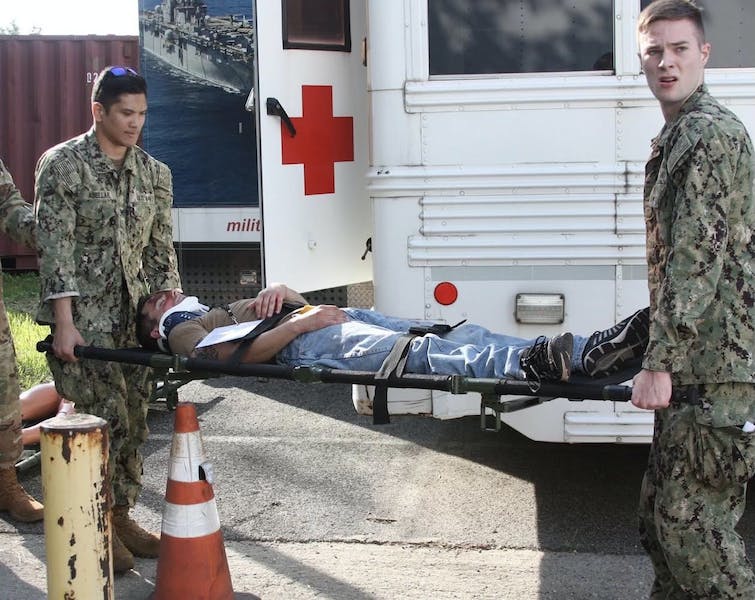If, a week ago, you had inquired about the 16 student veterans at Dartmouth, I would have been clueless. I was completely unaware of their presence on campus and the myriad challenges they encounter.
Consider Ryan Irving ’24, for instance. Prior to enrolling at Dartmouth, he served as an artillery Marine and a High Mobility Artillery Rocket System section chief, with deployments to Japan and Afghanistan under his belt. As one of the 12 U.S. military veterans at Dartmouth, he underscored the unparalleled nature of a military background.
Irving remarked, “Being in a missile launcher, whether traversing California or Afghanistan, or stationed in Japan, offers experiences that are truly unique to the military.”
Another veteran, David Ward ’25, made the transition from the Navy to Dartmouth nearly three years ago. As a former hospital corpsman trained in providing shipboard and combat casualty medical care, Ward noted the stark contrast between military life and civilian life.
“In the military, your communication style is different… you carry yourself in a distinct manner,” Ward explained.
Greg Beals ’26, an Army veteran, a firefighter in Manchester, N.H., and a full-time student, embarked on his Dartmouth journey this autumn, boasting a rather unconventional story even among veterans. Unlike the typical undergraduate student, Beals, in his 30s with a family, commutes to Dartmouth.
“I have a wife and a two-year-old daughter,” Beals shared. “Being a full-time firefighter, I commute from Manchester two to three times a week, which amounts to a two-and-a-half-hour round trip.”
Balancing a myriad of responsibilities as a Dartmouth student, Beals often grapples with tough decisions when it comes to time management.
“It’s incredibly challenging to juggle family life because, when I’m at home, I prefer spending time with my family over doing homework,” he admitted.
For these veterans, transitioning post-military service can be a profound “culture shock,” as Ward described it. Shortly after leaving the military, Ward found himself navigating the demanding academic environment at Dartmouth and readjusting to “normalcy.”
“It was quite disorienting for me initially,” he confessed. “Having had minimal interaction with civilians since leaving the military, I felt the need to relearn how to communicate normally and adapt to life as a Dartmouth student.”
Ruby Benjamin ’26, who served as a field intelligence soldier in the Israeli army for two years, highlighted the challenge of adapting to the newfound freedom of civilian life post-military service.
“In the military, your day is highly regimented—you have little autonomy. Your routine is dictated to you,” Benjamin explained.
The transition proves arduous for veterans not only due to the shift to civilian life but also in finding a new sense of community.
Leland Hemgren ’25, a former emergency medical technician transitioning to special operations, revealed that living off-campus with his partner during his freshman year added to the sense of isolation he experienced.
“Veterans residing in dorms were immediately integrated into the campus social fabric,” he noted. “In my case, during my freshman year, I felt completely disconnected.”
The age gap between veterans and their peers poses another early hurdle in their academic journey. Irving humorously reflected on how people often treated him as “the ancient one.”
“Even at 23 or 24, I was perceived as ‘the old guy,’” he quipped.
While the age gap no longer bothers him, Irving admitted that it posed challenges initially.
“I was quite self-conscious about my age back then,” Irving shared. “I refrained from engaging with other students, erecting social barriers because I felt different.”
In conversations with these veterans, the theme of feeling “different” emerged repeatedly. Upon arriving at Dartmouth, veterans grapple with concerns about their age and life experiences setting them apart. However, these unique experiences contribute to the diverse tapestry of backgrounds at Dartmouth. Assistant Dean of Undergraduate Veteran Students Morgan Ogreen recognizes the invaluable perspective and experiences veterans bring to campus.
“Working with veterans has been one of the greatest privileges of my career,” Ogreen expressed. “Whenever I have the opportunity to hear their stories, I am truly inspired.”
Ogreen works diligently to assist veterans in transitioning to the academic setting and planning for their post-service endeavors.
The Student Veterans Association serves as a vital resource, ensuring veterans find support and a sense of community on campus. Hemgren currently leads the association.
“Our primary aim is to foster a shared community among student veterans,” Hemgren explained. “We play a role in orientation for new veterans, both domestic and international, integrating them into the Student Veterans Association.”
Benjamin stressed the importance of connecting with individuals who share a military background and can relate to her journey.
“I have a few alumni friends who also served in the Israeli army and made the transition to Dartmouth like me,” she noted. “Maintaining contact with them and seeking their guidance has facilitated my adjustment.”
These resources have proven instrumental in helping veterans navigate the intricacies of the Dartmouth community, where non-veterans may be in awe—and at times, intimidated—by veterans’ knowledge and experiences. Nonetheless, veterans also stand to gain valuable insights from their peers, as Hemgren pointed out.
“Each person brings a unique perspective to the table… there’s always something to learn from a freshman,” Hemgren emphasized. “It’s about recognizing that every individual can offer insights, regardless of age or background.”
For Ward, the apparent differences that set students apart often mask the shared experiences that unite them in the journey to adulthood.
“Whether embarking on higher education or entering the military, at 18, you’re navigating new territory, leaving home for the first time,” Ward observed. “Everyone undergoes the process of becoming a responsible adult in this world.”
Students curious about veterans’ experiences should not hesitate to inquire, Beals encouraged.
“If you have any questions,” Beals reassured, “don’t be afraid of offending a veteran—it’s quite difficult to do so. Feel free to ask, and I’m confident we’ll have a meaningful conversation.”
